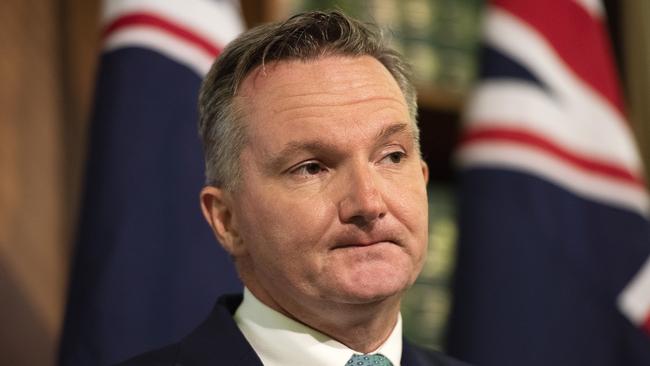
Well that’s cleared it up: Chris Bowen is not related to Gumby, that much-loved green plasticine man, but Bill Shorten is claiming Maggie Thatcher as a distant relative by telling us that he’s not for turning.
Labor’s treasury spokesman Bowen has had a bad six months. A number of his policy proposals are seriously misguided, while the timing now looks particularly unwise. Had he appreciated the extent to which the budget was improving by itself, he might have thought twice before embarking on such a high-risk strategy.
His response has taken the form of aggressive denial and surly petulance. Attack the government, attack those pointing out the errors of his ways, attack the voters.
This tactic reached a crescendo last week when he told retirees who would be adversely affected by the abolition of cash refunds for franking credits they could vote for the Coalition. What happened to governing for all Australians?
“The Liberals will run a scare campaign but their age of entitlement must end. This is the policy we will take to the election, it’s the right policy.” “Digging” and “keep” are words that spring to mind, particularly given Bowen has already tweaked the policy a number of times.
It’s a mystery as to why he has taken so many wrong turns when it comes to devising policy. Of course, he’s had to avoid the rookie error he made during the last election campaign when he announced a much larger cumulative budget deficit over the forward estimates — to the tune of $16.5 billion — than the Coalition.
He has therefore been forced to find additional revenue sooner rather than later. This in part explains the foolish proposal to eliminate cash refunds for franking credits, which will involve low-income earners facing higher rates of tax on share dividends than those earning more than $120,000 a year in taxable income.
This is surely not the Labor way. How can it be fairer to hit low-income earners harder than the better off? It’s Robin Hood in reverse with Bowen as the sheriff of Nottingham.
While trade unions, charities, not-for-profits and some age pensioners will be exempt from the policy, the elimination of cash refunds for franking credits will further distort the tax system and strengthen the incentives for older people to qualify for the Age Pension. There are reasons also to doubt the revenue projections — an additional $11.4 billion over the forward estimates and $55.7bn over a decade.
A number of companies have already started to distribute excess franking credits prior to the policy being implemented and fully franked shares will be traded so that the new owners are those who can gain maximum advantage of the franking credits. In other words, the projections of the additional revenue may be very optimistic indeed.
It’s worth recalling what Labor’s then Treasury spokesman Simon Crean had to say when prime minister John Howard first introduced these cash refunds in 2000: “It improves the current taxation system faced by low-income investors, especially retired Australians.” It was an improvement then, but Labor believes it now must be jettisoned.
There has also been a lot of discussion about Labor’s proposals to abolish negative gearing — save for new housing — and the halving of the capital gains tax discount. It’s interesting to ponder what sort of brain-snap Bowen experienced when he accepted these proposals based on the flimsiest of analysis.
The scope to reduce personal income tax using negative gearing, particularly in respect of housing, is curtailed in a number of other countries. There are various ways this can be done, by limiting the number of properties or by capping the size of the allowable deductions, for instance. Why Labor didn’t start with more modest restrictions on negative gearing is anyone’s guess. And why extend the elimination of negative gearing to other assets, given that the seeming rationale of the policy is to improve housing affordability and to favour owner occupiers over investors?
Again, the answer would seem to be about the dollars. The more additional revenue raised, the more scope for money to be redirected to Labor’s pet projects, particularly spending on the highly unionised education and hospital sectors. There is no real talk of using the additional revenue to seriously reform the tax system to improve equity and efficiency.
The timing of the negative gearing policy looks particularly ill-advised. Housing markets across most parts of the country are soft and the fall in house prices is accelerating at a record rate.
With question marks hanging over the apartment market and tight credit conditions, Bowen could not have picked a worse combination of factors when it comes to introducing a radical change to the taxation of investment.
Note that negative gearing has been part of the tax code for more than a century, with a very brief interruption under Bowen’s hero, former treasurer Paul Keating.
Again our modern-day sheriff of Nottingham is ushering in a policy that will continue to assist the well-heeled, with serious property investors able to deduct gearing and other costs against other investment income. Only mum-and-dad investors will be hit by the policy change.
When it comes to the change to the capital gains tax, this will place Australia at the very top of the international list in terms of the rate of this tax. In a world of global competition for capital, this seems a strange move.
Moreover, the grandfathering of the policy may well lead to an unfortunate lock-in of assets already held as well as a reluctance to invest in new ones.
A wildcard of the Labor tax package is the potential impact such a large additional tax burden has on overall economic conditions, which in turn could seriously undermine the rate of growth of revenue more generally. In fact, any serious reduction in the rate of economic growth would lead to a much greater fall-off in tax revenue than the gains associated with Labor’s individual measures.
We saw this effect around the time of the global financial crisis. In 2007-08, taxation added $279bn (or 23.7 per cent of GDP) billion to Treasury coffers. This amount fell sharply in the following years, with only $262bn (or 20.1 per cent of GDP) raised in 2009-10. Taxation as a percentage of GDP did not begin to rise again until 2011-12.
For Bowen, the timing of the release of the banking royal commission’s report yesterday is fortuitous. It will take the heat off him for the time being in terms of defending his largely indefensible tax-grab proposals and his refusal to play the role of Gumby.



